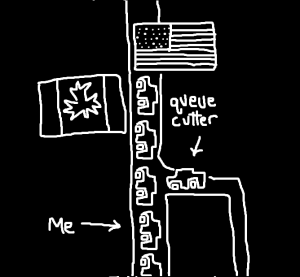
nile / Pixabay
I live near the Canada/USA border.
At several of the crossings, there is a side street that, when border lineups are very long, can take you a long way toward the front of the line.
These occasions afford us an uncomfortable glimpse into the human soul.
It drives me crazy to see people make this simple right turn in front of me. I have often wondered, after I finally get across the border and stop raging at my windshield, what goes through the minds of those who seem to have no problem cutting into the line in front of others who have been waiting for an hour already.
Then I found out. I was down at a Seattle Mariners game talking to another Canadian who also drove down for the game. He admitted that he bypassed a long border lineup by using that side street. “You don’t have a problem with cutting in line ahead?” I asked.
“Not at all,” he answered. “If those people are too dumb to circumvent the line, that’s their problem.” I don’t think he used the word “circumvent” but that was the idea.
I didn’t point out that I thought he was morally retarded.
[click_to_tweet tweet=”At last, an explanation of those people who cut into the border lineups.” quote=”At last, an explanation of those people who cut into the border lineups.”]
Moral Retardation
I did some research to figure out what was going on here. According to a guy named Lawrence Kohlberg, there are six levels of morality. If everything goes well, as you grow up, you will move up the ladder, hopefully, to the highest level, but for one reason or another, people can get stuck.
- The first level is called “Obedience and Punishment” where people will simply obey the rules because you could be punished if you don’t.
- The second stage is called “Individualism.” At this stage, people make moral judgments based on self-interest.
- The next level of morality is based on “Interpersonal Relationships.” Here one is concerned with living up to social expectations and roles.
- Some face moral choices based on a perceived duty to “maintain social order.” This fourth level begins to consider society as a whole in moral decisions but sees the rules and laws as coming from an authority.
- The fifth level is “Social Contract and Individual Rights.” At this stage moral questions are less black and white because there is an understanding of differing moral values and opinions. And rules and laws ought to be negotiated with others in society.
- The last level approaches moral judgments with ” Universal Principles” in mind. These abstract principles are arrived at through moral reasoning. Then they are internalized and followed even if they come into conflict with society’s rules and laws.
I will concede the border-cutter has achieved level one because there is not a “rule” that says you can’t drive on a legitimate street and make a legitimate right turn.
Further, his decision to jump the queue is definitely based on self-interest, so I think we can congratulate our subject for clearly having advanced to stage two.
Everyone in the line also wishes, out of self-interest, that they were further to the front. They just resist it. At level three, our subject would be taking into consideration how his behaviour would influence his relationship with others. On the one hand, this appears to have no effect on his behaviour because there are a lot of people who are really unhappy with him, and who would never allow him to date their daughters. But perhaps he has achieved this level; I don’t know if he would cut in front of his mother, for instance, because she might get mad and stop making his lunches and ironing his shirts.
Although there is no law that he has broken, I still don’t think he has achieved level four, because there is a blatant disrespect for the “authority” of society. If everyone behaved as he did, social order would be moved toward chaos. Because his behaviour can only work if there are a few who do it, it is, in principle, a behaviour that is immoral at this level.
The last two levels actually allow for some flexibility in one’s approach to rules and laws, but neither would accept cutting in line under these circumstances.
My diagnosis is that people who cut in lines at the border (and at the slide on your elementary school playground) are stuck in the second stage of moral development.
And that’s probably fine if you are six years old.
[click_to_tweet tweet=”My diagnosis is that people who cut in lines at the border (and at the slide on your elementary school playground) are stuck in the second stage of moral development. And that’s probably fine if you are six years old.” quote=”My diagnosis is that people who cut in lines at the border (and at the slide on your elementary school playground) are stuck in the second stage of moral development. And that’s probably fine if you are six years old.”]

